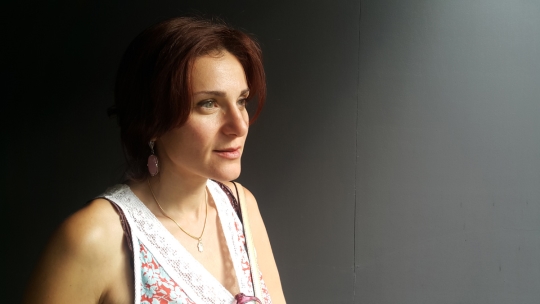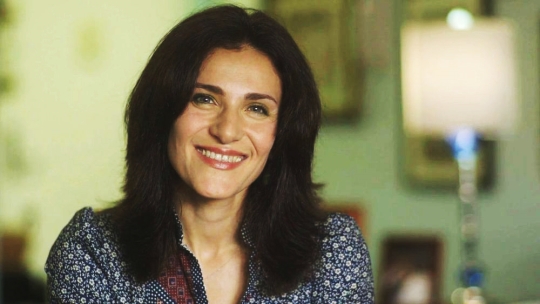Interview with Sophia Romma, the writer of the Korean premiere 'Port of Marina Tsvetaeva'
Let's overcome gender discrimination in theatre with women's solidarity and struggle.

'Women's gust of wind'. This year's award results of the Tony Awards, the best prize in Broadway musicals and theater, are summarized in one word. The musical 'Fun Home', which depicts the life of lesbians, won 5 gold medals, including the Best Musical Award and the Best Best Brickward, and the women also swept the main categories of the Best Director Award (Trater), the Best Stage Award (Theatrea), and the Best Costume Design Award (Musical). "Broadway's high gender discrimination barrier is gradually being broken down" is the reason why cheers broke out.
Sophia Romma, a writer who has been steadily expanding her position in the American performing arts world for more than 20 years, also smiled happily. "It's an amazing and happy change. It is proof that many women have been trying to achieve gender equality. If more people fight together, women's tomorrow will be dazzlingly bright."
Until he was reborn as a playwright, director and poet who crossed the United States and Russia, Rome had to cross the two barriers of women and immigrants. He was born in Moscow in the Cold War. In 1979, when he was 6 years old, he left for America with his family in search of a better life. He was fluent in both Russian and English, so he opened his eyes to the joy of writing early on and was fascinated by the play.
"My essence is an immigrant (émigré). Rome, who does not belong to either side and is always at a crossroads, created many works dealing with social issues such as immigration, sexuality, and gender. He is also a feminist who is natural to women's problems. 'The Past is Still Ahead', written in 2007, is a play depicting the curvy life of Russia's leading poet Marina Ivanovna Tsvetayeva, which was well received in New York and Russia. From August 28th, it was also on the domestic stage under the title 'Portrait of Marina Tsvetayeva' (troupe landscape, director Park Jung-hee). In line with this, I met Rome, who visited Korea, on Daehak-ro on August 29.

- 'Port of Marina Tsvetayeva' premiered in Korea for the first time in Asia.
"It is an honor to present this work to the audience of the world-class city of Seoul. During my stay in Seoul, I plan to watch not only the rehearsal but also this performance. I'm curious and looking forward to how Korean audiences will react to this work."
- Why was it Marina Tsvetayeva?
"Marina Tsvetayeva did not conform to the country's cultural control and tried to keep her artistic beliefs even in the midst of oppression. He was a true artist who thought about humanity, love, and freedom and expressed himself in his own way while living in an era full of sexual prejudice and discrimination. This performance seems to be more meaningful, especially due to the cultural and historical homogeneity of Russia and Korea. It is a history that was considered useless, not propaganda, not in accordance with the values presented by the state. In Russia, many writers, including Marina Tsvetayeva, were sacrificed during Stalin's period. I know that women and art have experienced similar sufferings in the midst of history in Korea."
Broadway is far to achieve gender equality, but there is hope.
The theater world needs more female manpower... Both men and women are also important.
When you dig into the problems of women and art, you can't help but encounter structural problems. Rome, which is based on Broadway in New York, emphasized that it must break the deep-rooted gender discrimination and 'glass ceiling' in the American theater industry. He is also active in theater women's organizations such as the Women's initiative at the Dramatists Guild and the League of Professional Women in Theater.
Rome said, "Women's interest in theater is so high that 70% of American theater audiences are women, but female theater people are treated unfairly in many ways." "Gender equality is an important issue not only in the performance industry but also in all fields. Women should continue to speak up about this, and change will happen," he emphasized.
- What is the level of gender equality in the American theater world?
"The level of gender equality in Broadway has steadily increased. In 2001, only 17% of American theater production was women, an increase of 22% according to recent surveys. This year's Tony Award results were meaningful. Works written, produced, and acted by women received attention, and actresses and female directors swept various major categories. However, the reality is that many women are still under-represented. The voices of female actors are relatively high, but there are no other field workers such as choreographers, stage designers, sound designers, and writers. The treatment of men and women is also different. Female theater people generally receive less funding and pay than men.
Sadly, people don't care much about this kind of problem. When we talk about gender equality, 'Men are bad!' It is sometimes misunderstood as a claim. However, gender equality is also directly related to the improvement of productivity in the theater industry. More talents and ideas can be born when men and women work in an equal proportion without being biased toward one gender."
- What kind of efforts do you think are needed to promote women's rights in the theater industry?
"The theater industry needs more women. Jobs should be given to women who are capable and need jobs. I also want to hire more women if I have the opportunity. Also, I try to reflect the voice of women as much as possible in my work and project. It is also important to realize gender parity in the theater industry. In the women's issue program of the American Playwrights Association, which I belong to, I am trying to make the number of works of female artists and male artists the same as the target of 2020.
- Mother of two children. How did you achieve a balance between work and life?
"If my parents hadn't helped me, I wouldn't have come this far. I was lucky. Especially my mother is a 'god of care'. I don't know how you are so dedicated to taking care of your children all day long (laugh). It's all thanks to my mother."
- If you have any advice you want to give to Korean female playwrights.
"It is important to have a perspective on women and women's issues. If you are a female writer, writing about these topics is something that contributes to improving women's rights. The characters and writers in the play are not separate. My love and soul are little by little in the characters I created. It was a very enjoyable and empowering experience to realize the similarities with me while writing about a great person like Marina Tsvetayeva. As my works were well received one after another, women had the same wit as men, and I gained confidence that I could write good literary works and satisfy readers and critics. You can do it too."
출처 : 여성신문(https://www.womennews.co.kr)
